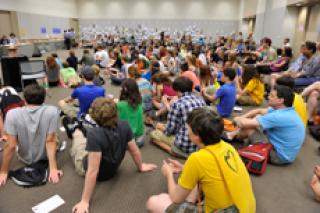Identity Formation, Faith Formation: Educating UU Youth
By Jessica York

The Indian philosopher, Chanakya (350-283 BCE), said, “Education is the best friend. An educated person is respected everywhere. Education beats the beauty and the youth.” As the Faith Development Director at the UUA, I often ask myself, “What sort of education is available for our UU youth?” So much identity formation happens during those teenage years; education should accompany this formation. The question of “Who am I?” should not be answered in a vacuum, but in a communal and historical context.
As a youth, one summer I attended a mock United Nations conference with other youth. I met a white, male youth with a unique accent. When I asked where he lived, he replied that he was South African. I was outraged that a white person was representing this African country and bound for a collision course with this young man. Originally declaring that I could not work with him, over time I decided to use his presence to educate myself instead. I learned that he was very proud to identify as a young South African leader and he was determined to eradicate apartheid. I learned more about the history of South Africa, the many-layered issues of race, politics, and power in that country. I left thinking that the situation was not as black or white as I had presumed, either there or here, in the U.S. I had presumed to know what role this young man played. I needed to ask myself what role I played in my country’s struggles.
We need to ask our young to engage with issues of race, ethnicity, class, power, and marginalization –- before their ideas get too set, before they start to put others (and themselves) in little boxes. Is this the job of religious education? I think it is. If religion is about making meaning of our world, the question of how to be in loving community with people who are different from me is a religious question.
A new UUA resource offers opportunities for youth to engage with ethnicity and race. Be the Change! is a multiculturalism and anti-racism project which offers a core training comprised of six, 90-minute sessions. A Facilitator Planning Guide describes ways to adapt the training for a variety of contexts, for example, a semester of youth group or a weekend conference. I encourage you to look it over and ask yourself if the youth in your congregation (or family, district, region, etc…) are ready to further their education on these issues.
Next Steps!
Explore the components of the new Be the Change! project for youth, online. See the Facilitator Planning Guide for supplementary resources to help you discuss race and ethnicity, such as the PBS series Race: The Power of Illusion. The Racial Justice and Multicultural Ministries and Identity Based Ministries pages on the UUA website suggest more materials.
The Skinner House books Voices from the Margins and Been in the Storm So Long are meditation guides featuring the words of Unitarian Universalists who are People of Color.
DRUUMM (Diverse and Revolutionary UU Multicultural Ministries) and ARE (Allies for Racial Equality) are two organizations of UUs committed to building an anti-racist, multicultural world.
Share with all ages the UU World Families pages from Fall 2010. The story (“Indra’s Magnificent Jeweled Net”), the activities, and the reflections and questions on the Parent Reflection page promote diversity and multiculturalism as aspects of our beloved community and our interconnected web of life.